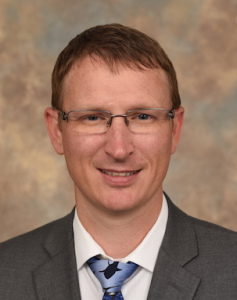Serving on the ABR Interventional Radiology Initial Certification Advisory Committee gave Christopher Bailey, DO, a chance to help his specialty by volunteering for a medical certifying board.
The committee, which Dr. Bailey joined on a recommendation by the Society of Interventional Radiology (SIR) in 2020, acts as a go-between for candidates and the ABR. He was part of the SIR Early Career Section at the time.
One of the committee’s charges in the early days was ensuring that candidates knew when they needed to take their certification exams. Interventional radiology became its own specialty in 2017.

“There were some graduates who were in the traditional fellowship pathway and others who were from a residency pathway,” he said. “The way they went about taking the certification exam was somewhat different. I was in the traditional pathway and the way I signed up was totally different than what the new graduates are doing today.”
As a member of the Initial Certification Advisory Committee, Dr. Bailey visited Tucson this past spring for a couple of days with a few of his colleagues. It was an enlightening experience.
“I was able to see the inner workings of what happens at the ABR, things like how a test gets created, and got to meet staff,” he said. “From that, I was able to say to myself, ‘OK, this is how stuff works and they’re obviously open to questions.’”
This past fall, Dr. Bailey stepped up his volunteer commitment after he was invited to serve as an ABR oral examiner for the IR Certifying Exam.
His first experience was gratifying and nerve-wracking.
“I was nervous because it was my first time, and I have candidates who are probably more nervous than me,” said Dr. Bailey, who’s an assistant professor in the department of radiology at Virginia Commonwealth University. “They’re worried that they’re going to not do well. On the other side, I’m thinking, ‘I don’t want to fail these people. I want them to pass.’ But I knew I had to use judgment and make sure that nobody would hurt a patient in the future.”
Before serving as an oral examiner, Dr. Bailey came up with the idea and volunteered to be a candidate for a mock exam video hosted by Anne Covey, MD, and James Spies, MD. Dr. Covey is on the ABR Board of Trustees and Dr. Spies is the ABR’s associate executive director for interventional radiology.
Dr. Covey said Dr. Bailey excelled both as a mock candidate and as a real examiner.
“He did an outstanding job as a would-be candidate, demonstrating for examiners and candidates what failing and passing exams looks like,” Dr. Covey said. “As an examiner, he was deliberate and thoughtful, and made sure to make the candidates feel comfortable so that they could focus on the content of the exam.”
As a first-time oral examiner, Dr. Bailey was thankful that he and some of his colleagues were invited to gather in person. He picked up valuable tips from more seasoned examiners that built his confidence and gained experience during the three-day exam session.
“When we had breaks or during dinner or breakfast, I could chat with people and get a sense of how they were presenting their cases for the day or how things went the day before,” Dr. Bailey said. “Gathering in person was amazing for me because I was able to talk with the more experienced examiners.”
After gaining insight into the oral exam process, Dr. Bailey was able to dismiss one myth that has concerned some candidates.
“The ABR’s not trying to fail you,” he said. “We’re not trying to trick you. We just want competent radiologists to show what they know.”
With his first oral examiner experience complete, Dr. Bailey is excited about the opportunity to continue helping his specialty as an ABR volunteer. The next oral administration for the IR Certifying Exam is in April.
“I received an email from the ABR about saving the date for the spring session,” he said. “I look forward to doing it again.”
It’s no surprise that the ABR wants Dr. Bailey to stay in its volunteer ranks. Dr. Spies sees him as a subject matter expert who represents the organization well.
“Chris is in many ways the ideal volunteer,” Dr. Spies said. “He had excellent training and is in a very strong practice currently, so his knowledge of IR is very good.”


